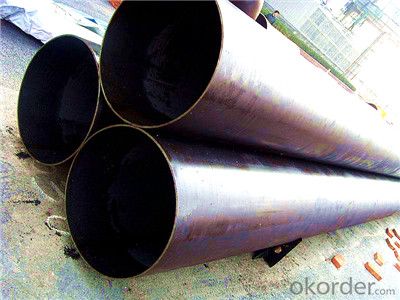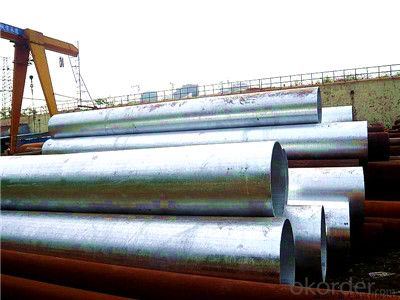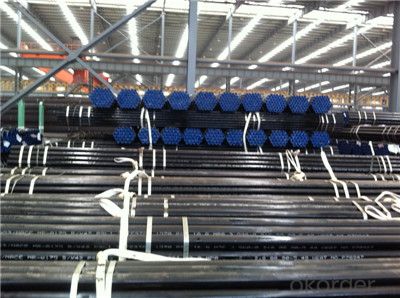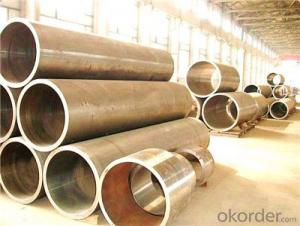hot selling Carbon Seamless Steel pipe from CNBM
- Loading Port:
- Tianjin
- Payment Terms:
- TT OR LC
- Min Order Qty:
- 50 m.t.
- Supply Capability:
- 2000000 m.t./month
OKorder Service Pledge
OKorder Financial Service
You Might Also Like
PRODUCT DETAILS
1.Structure of Seamless Steel Pipe Description:
A large amount of Seamless Steel Pipes is offered to the clients at cost effective rates. These pipes are extremely durable, resistant to corrosion and have high tensile strength. Our pipes are used in nuclear plants, power plants, refineries and construction industry across the country. Furthermore, we are capable of providing these seamless pipes to the clients in bulk quantity.
2.Main Features of the Steel Pipe:
• High manufacturing accuracy
• High strength
• Small inertia resistance
• Strong heat dissipation ability
• Good visual effect
•Reasonable price
3.Packaging & Delivery:
| Packaging Details: | Seaworthy packages, bundles wrapped with strong steel strip |
| Delivery Detail: | 15-30 days after received 30% TT |
4.Seamless Steel Pipe Specification:
| Standard: | GB, DIN, ASTM,ASME, ASTM A106-2006, ASTM A53-2007 |
| Grade: | 10#,20#, 45#, 16Mn |
Thickness: | 8 - 33 mm |
| Section Shape: | Round |
| Outer Diameter: | 133 - 219 mm |
| Place of Origin: | Shandong, China (Mainland) |
| Secondary Or Not: | Non-secondary |
| Application: | Hydraulic Pipe |
| Technique: | Cold Drawn |
| Certification: | API |
| Surface Treatment: | factory state or painted black |
| Special Pipe: | API Pipe |
| Alloy Or Not: | Non-alloy |
| Length: | 5-12M |
| Outer Diameter: | 21.3-610mm |
5.Product pictures



5.FAQ of Seamless steel pipe:
①How is the quality of your products?
Our products are manufactured strictly according to national and internaional standard, and we take a test
on every pipe before delivered out. If you want see our quality certifications and all kinds of testing report, please just ask us for it.
Guaranteed: If products’ quality don’t accord to discription as we give or the promise before you place order, we promise 100% refund.
②How about price?
Yes, we are factory and be able to give you lowest price below market one, and we have a policy that “ for saving time and absolutely honest business attitude, we quote as lowest as possible for any customer, and discount can be given according to quantity”,if you like bargain and factory price is not low enough as you think, just don’t waste your time.Please trust the quotation we would give you, it is professional one.
③Why should you chose us?
Chose happens because of quality, then price, We can give you both.Additionally, we can also offer professional products inquiry, products knowledge train(for agents), smooth goods delivery, exellent customer solution proposals.Our service formula: good quality+good price+good service=customer’s trust.
SGS test is available, customer inspection before shipping is welcome, third party inspection is no problem.
Any question, pls feel free to contact us !
- Q:What are the applications of steel pipes?
- Steel pipes have a wide range of applications in various industries due to their durability, strength, and versatility. Some of the common applications of steel pipes include: 1. Plumbing and water distribution: Steel pipes are commonly used in plumbing systems to transport water and other fluids. They are resistant to corrosion and can withstand high pressure, making them ideal for water distribution networks in residential, commercial, and industrial buildings. 2. Oil and gas industry: Steel pipes are extensively used in the oil and gas industry for the transportation of oil, natural gas, and other petroleum products. They are able to handle high-pressure and high-temperature environments, making them crucial in drilling, production, and refining processes. 3. Construction and infrastructure: Steel pipes are widely employed in construction projects for various purposes such as structural support, foundations, scaffolding, and underground piping systems. They provide a strong and reliable framework for buildings, bridges, tunnels, and highways. 4. Industrial applications: Steel pipes are used in various industrial applications such as manufacturing, power plants, chemical processing, and food processing. They are often used to transport liquids, gases, or slurries within the production processes or to transfer heat in heat exchangers and condensers. 5. Agricultural sector: Steel pipes are commonly used in the agricultural sector for irrigation systems, particularly in large-scale farming. They are used to transport water from a water source to the fields, ensuring efficient and controlled water distribution. 6. Mining industry: Steel pipes are utilized in the mining industry for the extraction and transportation of minerals, ores, and other mining materials. They are resistant to abrasion and corrosion, making them suitable for the harsh and demanding conditions of mining operations. 7. Mechanical and automotive applications: Steel pipes find application in the manufacturing of various mechanical components, such as automotive exhaust systems, hydraulic cylinders, and precision tubing. They offer high strength, dimensional stability, and resistance to impact and vibration. 8. Infrastructure and utilities: Steel pipes are commonly used in infrastructure projects for the transportation of sewage, stormwater, and wastewater. They are durable, resistant to chemical corrosion, and can withstand underground conditions, making them suitable for sewer and drainage systems. In summary, the applications of steel pipes are vast and diverse, ranging from plumbing and water distribution to oil and gas industry, construction, agriculture, mining, mechanical and automotive sectors, and infrastructure projects. Their robustness, versatility, and ability to withstand extreme conditions make them a fundamental component in numerous industries.
- Q:Why seamless steel pipe called seamless steel pipe?
- Seamless is relative to welded steel pipe, because welded steel pipe is welded with steel strip, seamless steel pipe is made of whole round steel empty, no welding seam.
- Q:How are steel pipes used in the construction of telecommunications towers?
- Steel pipes are commonly used in the construction of telecommunications towers as they provide a strong and durable framework for supporting the tower structure. These pipes are used to create the main mast or tower structure, providing stability and strength to withstand various weather conditions. Additionally, steel pipes are often used for mounting antennas and other equipment on the tower, ensuring secure installation and efficient signal transmission.
- Q:What is the weight and strength of steel pipes?
- The weight and strength of steel pipes differ based on their dimensions and the specific steel grade utilized. Typically, the weight of steel pipes is measured in pounds per foot or kilograms per meter. The strength of steel pipes is commonly evaluated in terms of yield strength and ultimate tensile strength. The weight of steel pipes can range from a few pounds per foot for smaller sizes to several hundred pounds per foot for larger diameters and thicker walls. Various factors, including the pipe's outer diameter, wall thickness, and length, impact the weight. For example, a 1-inch diameter steel pipe with a wall thickness of 0.125 inches may weigh approximately 0.67 pounds per foot. Conversely, a 12-inch diameter steel pipe with a wall thickness of 0.5 inches can weigh roughly 142 pounds per foot. The strength of steel pipes is determined by the grade of steel used, which can vary depending on the specific application and requirements. Commonly used steel grades for pipes include ASTM A53 for general purposes, ASTM A106 for high-temperature service, and API 5L for oil and gas transportation. These grades possess different yield strengths and ultimate tensile strengths. Yield strength denotes the amount of stress a steel pipe can endure before it starts to deform plastically. It is usually measured in pounds per square inch (psi) or megapascals (MPa). For instance, ASTM A53 Grade B steel pipe has a minimum yield strength of 35,000 psi (240 MPa), while API 5L Grade X65 steel pipe has a minimum yield strength of 65,000 psi (448 MPa). On the other hand, ultimate tensile strength signifies the maximum stress a steel pipe can withstand before fracturing. It is also measured in psi or MPa. For example, ASTM A106 Grade B steel pipe has an ultimate tensile strength of 60,000 psi (415 MPa), whereas API 5L Grade X65 steel pipe has an ultimate tensile strength of 77,000 psi (531 MPa). In conclusion, the weight and strength of steel pipes can vary based on their dimensions and the grade of steel used. The weight is influenced by factors like the pipe's diameter, wall thickness, and length, while the strength is determined by the steel's yield strength and ultimate tensile strength.
- Q:Galvanized steel pipe, PPR pipe, PE pipe, U-PVC pipe and HDPE double wall corrugated pipe and what is the difference between the characteristics of
- PE pipe, polyethylene pipe, the past is also commonly used in low temperature water, but because of its short life now use less prone to aging, more PE material for the production of plastic bags;
- Q:How are steel pipes insulated to prevent condensation?
- Steel pipes are insulated to prevent condensation by wrapping them with a layer of insulation material, such as foam or fiberglass, which creates a barrier between the cold surface of the pipe and the surrounding air. This insulation helps to maintain the temperature of the pipe, preventing it from reaching the dew point and thus avoiding condensation.
- Q:Which is more load-bearing, the same thickness of steel pipe and steel bar?
- The magnitude of the axial force acting on the steel member is only related to three factors, namely, the strength of the material, the sectional area of A and the longitudinal stability factor of F.
- Q:How seamless steel tube is formed?
- Hot drawing or cold drawing. The so-called cold is the billet from the thick wall tube is not heated, oil lubrication, with a steel sleeve inside, gradually elongated. Hot drawing is to make the billet tube red, do such work, generally thick wall applicable.
- Q:Are steel pipes suitable for pharmaceutical manufacturing facilities?
- Indeed, steel pipes prove to be a fitting option for pharmaceutical manufacturing facilities. Their outstanding resistance to corrosion and durability make them a prevalent choice in this industry. They are capable of enduring high levels of pressure and temperature, rendering them perfect for a wide range of purposes, including fluid, gas, and chemical transportation within the facility. Moreover, steel pipes possess the advantage of effortless cleaning and sanitization, guaranteeing the preservation and safety of pharmaceutical products. Additionally, they offer cost-effectiveness and boast an extended lifespan, solidifying their status as a dependable choice for pharmaceutical manufacturing facilities.
- Q:Can steel pipes be used for oil wells?
- Indeed, oil wells can utilize steel pipes. In the oil and gas sector, steel pipes are frequently employed owing to their robustness, longevity, and resistance to corrosion. They possess the capability to endure the immense pressures and temperatures experienced during oil well drilling and production. Moreover, steel pipes efficiently and securely transport oil from the well to the surface, making them the favored option for oil well infrastructure. Furthermore, steel pipes can be effortlessly welded and threaded, enabling convenient installation and maintenance in oil well applications.
1. Manufacturer Overview |
|
|---|---|
| Location | |
| Year Established | |
| Annual Output Value | |
| Main Markets | |
| Company Certifications | |
2. Manufacturer Certificates |
|
|---|---|
| a) Certification Name | |
| Range | |
| Reference | |
| Validity Period | |
3. Manufacturer Capability |
|
|---|---|
| a)Trade Capacity | |
| Nearest Port | |
| Export Percentage | |
| No.of Employees in Trade Department | |
| Language Spoken: | |
| b)Factory Information | |
| Factory Size: | |
| No. of Production Lines | |
| Contract Manufacturing | |
| Product Price Range | |
Send your message to us
hot selling Carbon Seamless Steel pipe from CNBM
- Loading Port:
- Tianjin
- Payment Terms:
- TT OR LC
- Min Order Qty:
- 50 m.t.
- Supply Capability:
- 2000000 m.t./month
OKorder Service Pledge
OKorder Financial Service
Similar products
New products
Hot products
Related keywords































